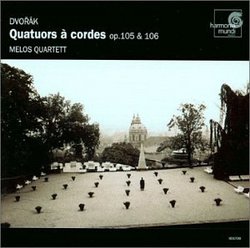| All Artists: Melos Quartet Title: Dvorak: String quartets Members Wishing: 0 Total Copies: 0 Label: Harmonia Mundi Fr. Release Date: 7/10/2001 Album Type: Import Genre: Classical Styles: Chamber Music, Historical Periods, Classical (c.1770-1830) Number of Discs: 1 SwapaCD Credits: 1 UPC: 794881628421 |
Search - Melos Quartet :: Dvorak: String quartets
 | Melos Quartet Dvorak: String quartets Genre: Classical These are Dvorák's last and greatest quartets. He wrote them simultaneously after his return home from America in 1895, so the numbering is ambiguous and often reversed. The quartets overflow with romantic ardor and ... more » |
Larger Image |
CD Details
Synopsis
Amazon.com
These are Dvorák's last and greatest quartets. He wrote them simultaneously after his return home from America in 1895, so the numbering is ambiguous and often reversed. The quartets overflow with romantic ardor and lyricism; beguiling, heartwarming melodies; pungent, spicy rhythms; and inspired harmonies and modulations. They reach the depths and heights of human emotion, from intimate inwardness and radiant serenity to ecstasy and exuberance. The end of Op. 106 seems to interweave past and present, reverie and reality, as Dvorák, in a reluctant valediction, nostalgically combines themes from earlier movements with those of the Finale. The instrumental writing is full of intricate counterpoint and very demanding for all four players: viola and cello are prominent, the two violins almost equal except that the first soars more radiantly. The Melos Quartet does very well technically, but they are tonally and musically disappointing. The sound is dry and inexpressive; the balance favors the bass, eclipsing the first violin. The playing is tame, cool, stiff, emotionally restrained, rhythmically inflexible--in short, totally unromantic, as if the musicians were afraid to show their feelings. The absence of the music's characteristic lilt invites interesting comparisons with two Czech String Quartets, who have Dvorák's idiomatic rhythms and inflections in their blood. They are very different from each other, proving that musical affinity goes beyond nationality. The Vlach Quartet Prague (Naxos 8.553371 and 8.553374) is the Melos's exact opposite: bright and lush in tone, effusive, extroverted, free, with extreme tempos and excessive contrasts of dynamics and character. The Talich Quartet (Calliope CAL 9280) is the most satisfying: their tone is warm, varied, nuanced, and very expressive; their feeling for the music in all its changing moods is so deep and strong that they need no exaggeration. --Edith Eisler
